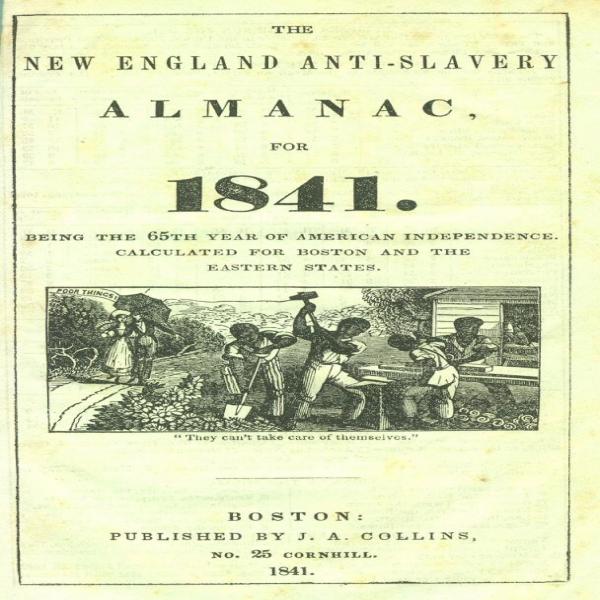How to Agitate the Public Mind
Original

Background Notes
Like other movements for social change in nineteenth−century America, antislavery used the printed word as one of its primary instruments of persuasion. To publicize the evils of slavery and stir up opposition, abolitionists published newspapers, pamphlets, hymn books, song books, children’s books, and almanacs. These works were weapons in the battle against slavery. Their texts and illustrations were intended to outrage readers and convince them to take action. The inexpensive almanacs also provided advice to local “grass−roots” abolitionists about how to further the cause in their own communities. Their readers were urged to share them with family members and to “see to it that your neighbors, your relatives, your minister, the schoolmaster have a copy.”
Transcription of Primary Source
Excerpts from The New England Anti−Slavery Almanac for 1841.
BUYERS OF SLAVE PRODUCTS, PARTNERS IN A SLAVE−HOLDING FIRM.
Most of the work done in our cotton factories is done by girls. Now suppose the owners of these factories held all these girls as slaves. Suppose they have torn them from their parents...and driven them to their establishments, where they keep them under drivers, and the whip from daylight till dark, half−fed, half−clothed, with no bed but the floor or ground, and no bedding but a blanket...Reader, put it to your conscience; would you patronise such factories?...
Now what we have supposed respecting those factories, every abolitionist knows is the naked reality of practical slavery in the United States. All these outrages are actually inflicted upon the slaves of the south; for the purpose of wringing from them the cotton, rice, sugar, molasses, and tobacco, contracted for by northern merchants, and paid for with northern money. The demand is the cause, the supply is the effect; and the slaveholder’s tortures and robberies are the sole means used to produce the effect. Whoever buys, whoever uses the products of slave−labor creates the demand, he plies the cause, he produces the effect, he USES THE MEANS. If you buy or use the products of slave−labor, the slaveholder is your agent in all the tortures he employs to extort that labor for which you pay him... You, the buyer and consumer...are the mainspring of the entire machinery of slavery. You originate, direct, and control its action. If the mainspring dont act, the machinery stops, the slave is no longer tortured, and no longer a slave. Do you say, “I am only a part of the mainspring—only one customer out of millions.” Well, for that part ...you are accountable—see to it...
THINGS FOR ABOLITIONISTS TO DO.
1. Speak for the slave; plead his cause everywhere, and make every body feel that you are in earnest. Get up anti−slavery discussions in debating societies, lyceums, and wherever you can get an opening, abroad and at home...wherever you find [a] mind to be influenced, speak for the slave...
2. Write for the slave. Do you take a religious or a political paper? write a short article for it, a fact, an argument, an appeal, a slave law...something short and pithy...in short, something, if not more than five lines, full of liberty, and get them into your newspaper...
3. Petition for the slave. Begin at once to circulate petitions for the immediate abolition of slavery in the District of Columbia, and in Florida, against the admission of Florida into the Union as a slave state, for the prohibition of the internal slave trade...Let every abolitionist bestir himself also in circulating petitions to the legislature of the state in which he lives, praying the repeal of all laws graduating rights by the skin.
4. Work for the slave. Distribute anti−slavery publications, circulate them in your neighborhood, take them with you on journeys, take them as you go to meetings, to the polls, to the stores, to mill, to school, and every where; establish an anti−slavery library; get subscribers for anti−slavery newspapers, and collect money for anti−slavery societies; gather facts illustrating the condition of slaves; search out all who have lived in slave states, get them to write out their testimony as to the food, clothing, lodging, shelter, labor, and punishments of slaves, their moral condition, the licentiousness of slave−holders, and forward them to some anti−slavery paper for publication...
5. Work for the free people of color; see that your schools are open to their children, and that they enjoy in every respect all the rights to which as human beings they are entitled. Get merchants to take them as clerks, mechanics as apprentices, physicians and lawyers as students: if the place of worship which you attend has a negro seat*, go and sit in it.
HINTS TO ANTI−SLAVERY DEBATERS.
1. Keep your temper.
2. Stick to the point, and keep your opponent to it.
3. Dont ridicule his arguments, but show that they ridicule themselves.
4. Make no random statements, prove all things.
5. Have your proofs ready, so that you can turn to them at once. Nothing tires and provokes an audience like fumbling and fumbling for what you should have at your fingers’ ends.
6. Never present an argument which you are not sure is sound.
7. Never degrade yourself and your subject by stooping to bandy words with your opponent, nor by playing off witticisms and smart speeches to set the audience a giggling.
8. Dont declaim but argue.
9. Dont be abstruse, far−fetched, and wire−drawn*, but plain and simple, so that every body can understand exactly what you mean.
10. Dont try to set off yourself, but your subject.
11. Dont leave a point till you have settled it. One point settled is better than a thousand made plausible.
12. Dont waste your time on little things, but, at the outset, seize some great point, and push it; powder spent on small game is thrown away.
Glossary
- negro seat − segregated seats for blacks
- wire−drawn − drawn out to great length and thinness; as to wiredraw an argument